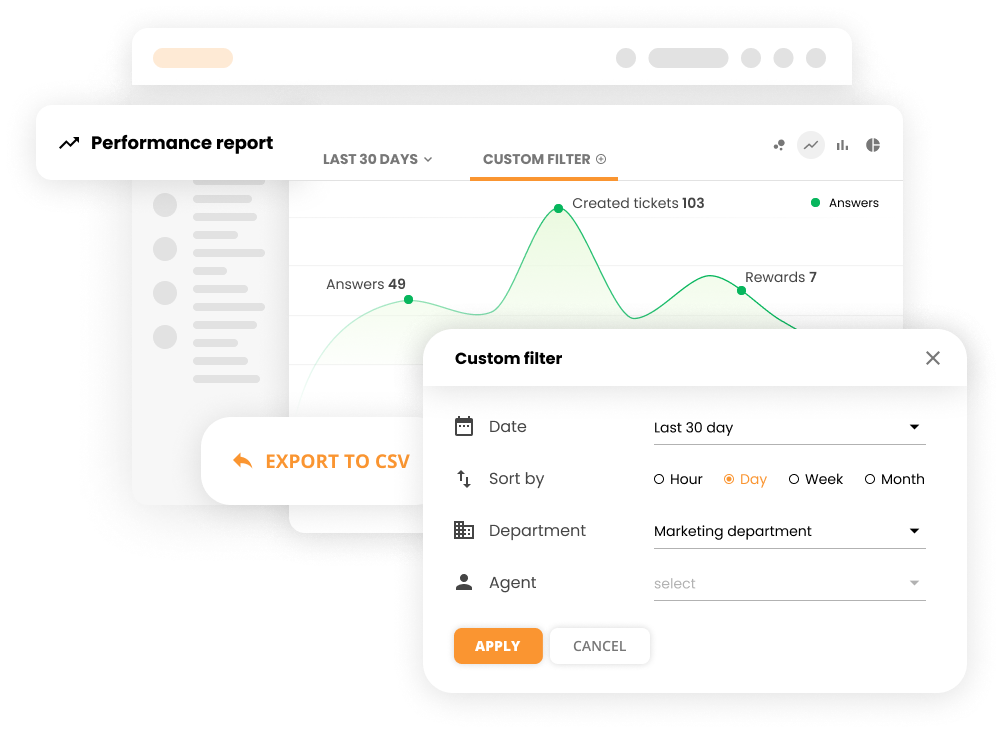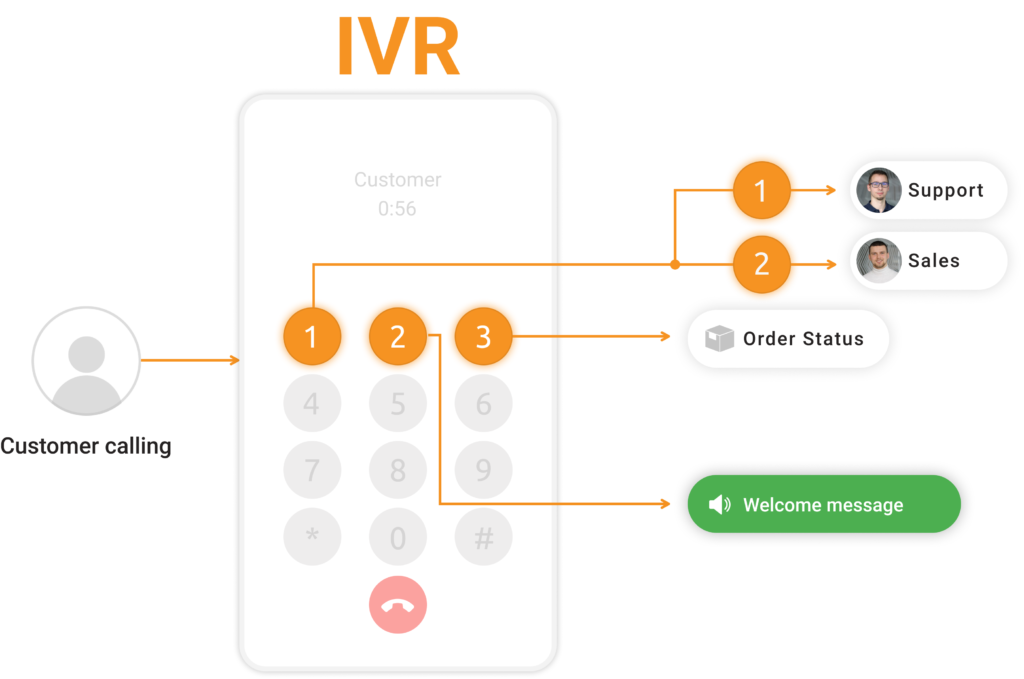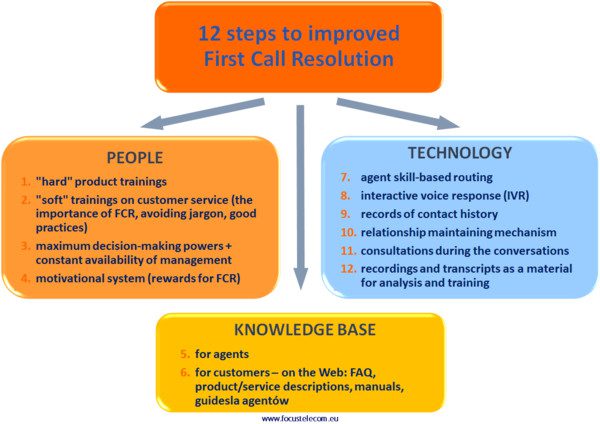What is a first call resolution?
First call resolution (FCR) is also referred to as first contact resolution or one call resolution. It is one of the most critical customer service metrics in the contact center industry. It measures the company’s ability to resolve customer issues and inquiries in the first interaction, with no escalations or follow-ups required by the customer service agents.
The customer experience improves with a successful first call resolution, as they get their elaborate or common questions answered and requests resolved during the initial contact.
Having a high FCR rate means preventing any dissatisfied customer and increasing customer retention.
Is first call resolution an important metric for your customer service score?
First call resolution is an essential metric to gauge your overall customer satisfaction score. This ties into the quality of customer service and support your business provides.
The speed of service delivery and your support team’s ability to resolve customer issues in the first interaction is an important characteristic of exceptional customer service. Consumers naturally prefer to get their requests handled by a single agent during a single customer interaction.
That is why a high FCR rate is almost always associated with satisfied customers. FCR also helps contact center leaders measure the efficiency of their contact center agents.
Calculation of first call resolution
To calculate your first call resolution rate (or first contact resolution rate), you need to divide the total number of resolved cases on the first outreach by the total number of received cases during the given period (can be calculated daily, weekly, monthly, etc.).
This FCR calculation method uses the following formula:
FCR = (Total Resolved Cases / Total Number of Cases) x 100%
External FCR measurement methods are considered to be the most accurate. They let customers judge whether their issues were resolved successfully on first contact. A simple question can be asked during the call. You can also use post-call phone or email customer surveys to get customer feedback.
The internal measurement methods tend to have less accuracy since the organization determines whether they achieved FCR based on their own standards (usually , whether the customer contacts called back regarding the same complex issue within a certain time period).

What is a good first call resolution rate?
Various studies indicate, the industry standard for a good first call resolution rate is between 70 to 75%. Which means that around 30% of customers have to call back regarding the same issue.
In general, over 90 % FCR rate is considered high, while anything under 40% is considered low.
The higher your FCR rate, the better the quality service you provide. However, your measure of FCR may greatly differ across industries. Depending on how complex your product or service is.
Benefits of first call resolution
A higher first call resolution rate results in increased customer satisfaction, efficiency, and cost savings for businesses.
In fact, based on a study by SQM Group, the majority of consumers calling a call center expect their issues to be resolved on the first call. The study also revealed that:
- Customer satisfaction drops by 15% on average each time a customer has to call back to follow up on the same issue.
- 23% of consumers are likely to stop using the company’s products and services, if their call is unresolved.
- For every 1% improvement in FCR, companies see a 1% improvement in CSAT.
- For every 1% improvement in FCR, call centers can reduce operating costs by 1%.
Challenges of first call resolution
When trying to improve FCR rates, businesses often face a number of challenges. Most call center managers struggle to define and measure it correctly.
Another common challenge may be inefficient internal processes. These could be agent knowledge gaps due to insufficient or inaccessible information, high agent turnover, lack of proper agent training and lack of authority to resolve common issues without escalating them further.
What affects first call resolution
Since first call resolution is a complex call center metric, it can be affected by numerous factors. In addition to the challenges mentioned above, FCR can be influenced by the following:
- Effectiveness of call routing systems: ACDs and IVRs usually route incoming calls to the most appropriate departments or agents that are best suited to meet customers’ needs. The effectiveness of these call routing systems has a major impact on efficient first call issue resolutions.

- Complexity of the product/ service: Companies selling complex products or services (usually IT and SaaS), are likely to have lower first call resolution rates. It is due to the complexity of typical customer calls (e.g., troubleshooting technical issues may require more escalations and follow-ups.)
- Long hold times: Callers may be put on hold for a number of reasons, such as when an agent needs to refer to a knowledge base or verify customer information. Long hold times may lead to negative experiences and abandoned calls. These ultimately result in lower first call resolution rates.
Best practices for first call resolution
- Easy access to accurate information: If agents don’t have immediate access to comprehensive customer information (history of previous interactions, purchase history, etc.), lack accurate product knowledge, don’t have access to an internal knowledge base, they are less likely to resolve customer issues on the first attempt. Equipping agents with professional contact center software that offers a 360-degree customer view and provides easy access to in-depth internal knowledge resources is critical to improving FCR.
- Agent empowerment: If agents aren’t authorized to perform certain actions (like issue returns, apply discounts, handle billing issues) or make decisions without getting approval from their superiors, it might lower FCR rate. Reviewing company policies and procedures and empowering agents with more authority to resolve issues can have a positive effect on FCR rates.
- Efficient coaching and cross training: Call center agents should be well-informed about a company’s products/ services. They should be trained on how to handle various queries, troubleshoot complex issues and work with difficult customers. The regular coaching and cross-training of agents ensures they always have the right knowledge and are well prepared to handle customer requests within the first contact.

Improvement of first call resolution
Improving first call resolution is an important goal for call centers. Below are some of the tips and action steps you can take to improve your FCR rate:
- Based on your current results, set an FCR rate improvement goal for your call center.
- Do not set conflicting performance goals, such as increasing FCR and reducing average handling time (AHT) at the same time.
- Identify the most common inefficiencies, issues, and knowledge gaps to understand the root causes behind low FCR.
- Create an informative, detailed knowledge base agents can easily refer to whenever needed.
- Make critical customer data readily available for agents through integrating your call center software with CRM.
- Record calls and review support interactions from each communication channel for quality monitoring and identifying weak spots.
- Review your internal procedures and policies that lead to repeated calls.
- Hold regular coaching sessions to ensure agents are always equipped with the right knowledge and skills.
- Empower agents to resolve certain issues without approval from senior agents/ managers.
- Motivate agents and improve company morale to increase agent engagement and productivity.
Discover the power of First Call Resolution with LiveAgent
Learn how to resolve customer issues effectively and efficiently
Frequently Asked Questions
What is repeat contact in call center?
Repeat contact in a call center refers to a situation where a customer contacts the call center multiple times for the same issue or query. This could happen due to various reasons such as the initial contact not resolving the issue, lack of clear communication, or the need for further assistance. It is an important metric for call centers to track as it can indicate areas for improvement.
What does first call resolution mean?
First-contact resolution (FCR) is one of the most important contact support metrics. It measures the proportion of support requests that are resolved in the first contact without escalations, follow-ups, or any other additional actions.
Is first call resolution an important metric for your customer service score?
FCR is a key driver of customer satisfaction. Clients prefer their issues resolved during the first interaction with a company. That makes FCR an important metric for measuring overall support quality.
How is first call resolution calculated?
FCR rate is calculated by dividing the total number of resolved cases on first contact by the total number of cases during a given time period. To collect data, you can use either external or internal FCR measurement methods.
What is a good first call resolution rate?
An industry standard for a good FCR rate is around 70-75%. The number can vary across industries and the complexity of a company's product or service. In general, the higher your FCR rate, the better.
What are the benefits of first call resolution?
The main benefit is the improvement of customer satisfaction and customer retention. With each follow-up call required to resolve the same issue, customer satisfaction drops by 15%. In addition, for every 1% improvement in FCR, call centers see a 1% improvement in CSAT and a 1% reduction in operational costs.
What are the challenges of first call resolution?
One of the biggest challenges businesses face is in defining and calculating their FCR rates. Poor agent training, lack of authority to resolve issues without escalating, high agent turnover, or an insufficient knowledge base also tend to cause issues.
What affects first call resolution?
First call resolution may be affected by many factors, such as the efficiency of call routing systems or long hold times. Also, it is important to factor in the complexity of the company's products or services - dealing with complex issues may require more escalations and follow-ups.
What are best practices for first call resolution?
Providing agents with easy access to critical customer data, knowledge base articles, enabling them to make decisions without having to escalate or transfer calls, as well as providing efficient cross-training.
How do I improve my first call resolution?
Set the right goals and avoid conflicting priorities. Identify the root causes for repeat calls, build a comprehensive knowledge base, give agents more authority, review and improve your internal processes, and hold regular coaching sessions for agents.
After learning about first call resolution, you might want to explore the differences and benefits of first contact resolution. This article explains how to measure it and provides best practices to enhance your customer support. Additionally, understanding the first contact resolution rate is crucial, as it dives into how to calculate this rate and what makes a good resolution rate. This knowledge will help you improve your overall customer service effectiveness.

 Български
Български  Čeština
Čeština  Dansk
Dansk  Deutsch
Deutsch  Eesti
Eesti  Español
Español  Français
Français  Ελληνικα
Ελληνικα  Hrvatski
Hrvatski  Italiano
Italiano  Latviešu
Latviešu  Lietuviškai
Lietuviškai  Magyar
Magyar  Nederlands
Nederlands  Norsk bokmål
Norsk bokmål  Polski
Polski  Română
Română  Русский
Русский  Slovenčina
Slovenčina  Slovenščina
Slovenščina  简体中文
简体中文  Tagalog
Tagalog  Tiếng Việt
Tiếng Việt  العربية
العربية  Português
Português 

